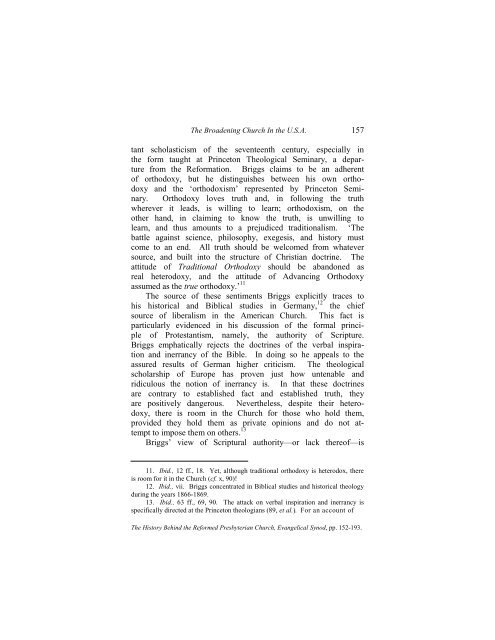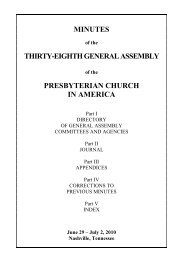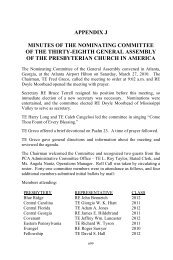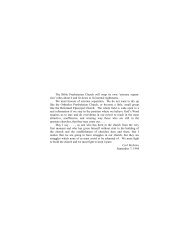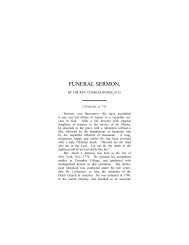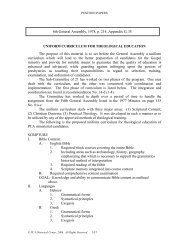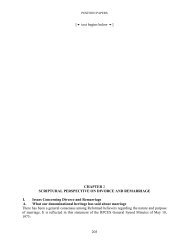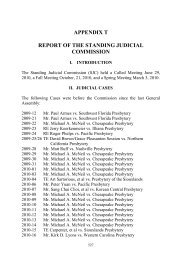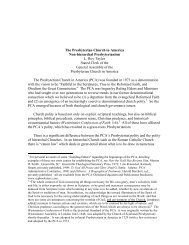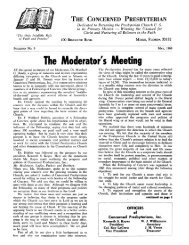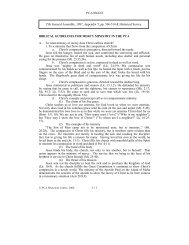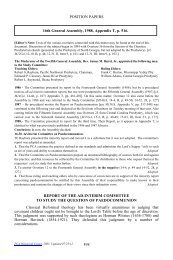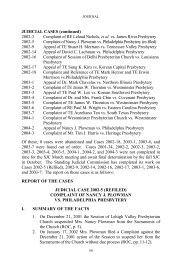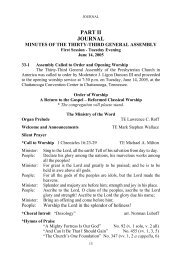Chapter 5: The Broadening Church in the USA - PCA Historical Center
Chapter 5: The Broadening Church in the USA - PCA Historical Center
Chapter 5: The Broadening Church in the USA - PCA Historical Center
You also want an ePaper? Increase the reach of your titles
YUMPU automatically turns print PDFs into web optimized ePapers that Google loves.
<strong>The</strong> <strong>Broaden<strong>in</strong>g</strong> <strong>Church</strong> In <strong>the</strong> U.S.A. 157tant scholasticism of <strong>the</strong> seventeenth century, especially <strong>in</strong><strong>the</strong> form taught at Pr<strong>in</strong>ceton <strong>The</strong>ological Sem<strong>in</strong>ary, a departurefrom <strong>the</strong> Reformation. Briggs claims to be an adherentof orthodoxy, but he dist<strong>in</strong>guishes between his own orthodoxyand <strong>the</strong> „orthodoxism‟ represented by Pr<strong>in</strong>ceton Sem<strong>in</strong>ary.Orthodoxy loves truth and, <strong>in</strong> follow<strong>in</strong>g <strong>the</strong> truthwherever it leads, is will<strong>in</strong>g to learn; orthodoxism, on <strong>the</strong>o<strong>the</strong>r hand, <strong>in</strong> claim<strong>in</strong>g to know <strong>the</strong> truth, is unwill<strong>in</strong>g tolearn, and thus amounts to a prejudiced traditionalism. „<strong>The</strong>battle aga<strong>in</strong>st science, philosophy, exegesis, and history mustcome to an end. All truth should be welcomed from whateversource, and built <strong>in</strong>to <strong>the</strong> structure of Christian doctr<strong>in</strong>e. <strong>The</strong>attitude of Traditional Orthodoxy should be abandoned asreal heterodoxy, and <strong>the</strong> attitude of Advanc<strong>in</strong>g Orthodoxyassumed as <strong>the</strong> true orthodoxy.‟ 11<strong>The</strong> source of <strong>the</strong>se sentiments Briggs explicitly traces tohis historical and Biblical studies <strong>in</strong> Germany, 12 <strong>the</strong> chiefsource of liberalism <strong>in</strong> <strong>the</strong> American <strong>Church</strong>. This fact isparticularly evidenced <strong>in</strong> his discussion of <strong>the</strong> formal pr<strong>in</strong>cipleof Protestantism, namely, <strong>the</strong> authority of Scripture.Briggs emphatically rejects <strong>the</strong> doctr<strong>in</strong>es of <strong>the</strong> verbal <strong>in</strong>spirationand <strong>in</strong>errancy of <strong>the</strong> Bible. In do<strong>in</strong>g so he appeals to <strong>the</strong>assured results of German higher criticism. <strong>The</strong> <strong>the</strong>ologicalscholarship of Europe has proven just how untenable andridiculous <strong>the</strong> notion of <strong>in</strong>errancy is. In that <strong>the</strong>se doctr<strong>in</strong>esare contrary to established fact and established truth, <strong>the</strong>yare positively dangerous. Never<strong>the</strong>less, despite <strong>the</strong>ir heterodoxy,<strong>the</strong>re is room <strong>in</strong> <strong>the</strong> <strong>Church</strong> for those who hold <strong>the</strong>m,provided <strong>the</strong>y hold <strong>the</strong>m as private op<strong>in</strong>ions and do not attemptto impose <strong>the</strong>m on o<strong>the</strong>rs. 13Briggs‟ view of Scriptural authority—or lack <strong>the</strong>reof—is11. Ibid., 12 ff., 18. Yet, although traditional orthodoxy is heterodox, <strong>the</strong>reis room for it <strong>in</strong> <strong>the</strong> <strong>Church</strong> (cf. x, 90)!12. Ibid., vii. Briggs concentrated <strong>in</strong> Biblical studies and historical <strong>the</strong>ologydur<strong>in</strong>g <strong>the</strong> years 1866-1869.13. Ibid., 63 ff., 69, 90. <strong>The</strong> attack on verbal <strong>in</strong>spiration and <strong>in</strong>errancy isspecifically directed at <strong>the</strong> Pr<strong>in</strong>ceton <strong>the</strong>ologians (89, et al.). For an account of<strong>The</strong> History Beh<strong>in</strong>d <strong>the</strong> Reformed Presbyterian <strong>Church</strong>, Evangelical Synod, pp. 152-193.


